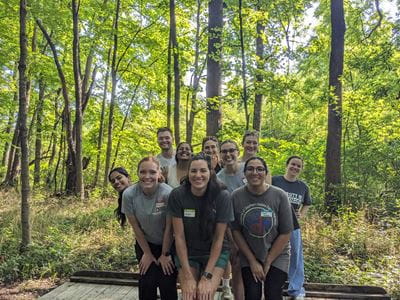When residents think about training in obstetrics and gynecology, rock climbing isn’t the first activity that comes to mind. But at the annual resident outing at Jameson Camp, that’s exactly what residents do.
Jameson Camp offers summer camps to children with physical and mental health diagnoses. The facility also hosts companies and other groups for team bonding activities. “Us paying to go helps fund kids who can’t afford to go,” explained Ava Warrenfelt, Residency Program Manager.
Camp leaders guide residents through traditional summer camp activities while emphasizing teamwork and clear, direct communication. Jameson Camp helps residents hone their skills in problem-solving and working under pressure.
“They have to figure out team dynamics in scenarios that are similar but different enough from their day-to-day life,” Warrenfelt explained. Although it seems fun and sends residents back to their summer camp days, faculty and staff have seen how important the camp is in developing residents’ skills for clinicals, didactics and real-world emergencies.
“It helps them learn to communicate in physically challenging situations more clearly, but with the luxury of time.” As future obstetricians and gynecologists, these skills are foundational to the many experiences residents encounter.
Skills building at Jameson Camp
The residency program has brought residents for team-building activities for the last seven years. This year’s activities included rock climbing and organizational challenges that helped residents think through team dynamics and identify different strengths.
“In the breadth of residency, a hierarchy comes into play. There are different points during each shift where someone who might be a lower level must take charge. So even though there were PGY3s and PGY4s, there were moments when you saw interns take charge,” Warrenfelt said.
Ali Alderson, MD, PGY-1, enjoyed the camp activities. It was a great opportunity for her and other interns to meet the second-, third- and fourth-year residents, all while working on important skills.
“We were tasked with arranging ourselves on a wooden log by birth month without touching the ground or talking,” she explained. “I needed to get from one end of the pole to the other. This meant I needed more people to swap with me, but they were more than happy to. They didn’t fault me for needing extra help.”
Although there won’t be any silent log challenges in labor and delivery, Alderson is confident she took skills away from the activity. “It showcased people’s communication styles, creativity and leadership skills in a problem-based environment. I know that I’ll be able to ask for help from my team at work with more confidence after the exercise.”
“When they were on the log doing the balance work, five or six of them hadn’t done it before. At first, everyone is doing something different, just trying things out while they can talk,” Warrenfelt shared. “During the second part, they identify clearly who is good at what, then play to those strengths.”
This skill is highly transferable to the exams, operations, deliveries and other medical procedures the residents perform.
Boundary setting through breaking boundaries
To Warrenfelt, one of the best aspects of camp is the emphasis on boundary-setting. “Everyone is allowed to say no, and the camp outlines a culture to not shame people who say no,” Warrenfelt explained.
This boundary-setting practice is crucial for residents, who must become comfortable saying no and acknowledging their limits. Still, there’s a fine line between setting boundaries and stepping outside of one’s comfort zone.
“At the same time, we encourage residents who are intimidated by the tasks to be scared and vulnerable but still try anyway,” Warrenfelt continued.
She saw this most with rock climbing. The residents had to rely on their other colleagues to make it safely to the top. Although some residents were scared to do so, their peers encouraged them to try, offering physical and emotional support to do it. “It’s about overcoming that fear and trusting your other residents.”
That trust transfers to the medical setting, where residents work together and grow into capable, compassionate physicians.
